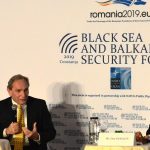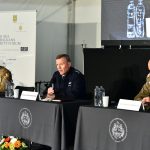Event concept and panel description
The ninth edition of the Black Sea and Balkans Security Forum will be held on 22-23 May 2025 in Bucharest. Organized by New Strategy Center, a prominent Romanian think tank, the event enjoys institutional backing from the Ministry of National Defence, the Ministry of Foreign Affairs, and is co-sponsored by the NATO Public Diplomacy Division. This edition’s academic partner is the University of Agricultural Sciences, taking into account the importance of the Black Sea region for the stability of global food security. As one of the largest and most influential security forums in the wider Black Sea region, the 2025 Forum will continue its tradition of fostering high-level dialogue and providing a vital platform for advanced analysis, informed decision-making, and the exchange of ideas on the most pressing and complex issues in international relations, security studies, and defense policy. By bringing together experts, policymakers, academics and representatives of the private sector from around the world, the Forum aims to deepen understanding and stimulate cooperation on the evolving challenges facing the region and beyond.
The partner country for the 2025 edition of our forum will be France. Romania and France share a longstanding special relationship, based on historical and cultural ties, strengthened by France’s significant economic presence in Romania and vital role in ensuring stability in the Black Sea region, underscored by its leadership of the NATO multinational battlegroup in Romania. The battlegroup’s presence not only supports Romania’s defense capabilities but also strengthens transatlantic security cooperation, highlighting France’s commitment to maintaining stability in this increasingly volatile region.
The Black Sea and the Balkan Peninsula are two interlinked geostrategic regions that form a critical arc of vulnerability, where historical tensions and modern security challenges intersect. These regions are a strategic continuum, sharing a complex history of cultural and geopolitical struggles, which continues to shape their security landscapes today. In the current geopolitical context, the ongoing war in Ukraine has intensified regional instability around the Black Sea, reflecting the fundamental nature of the challenges that the rules-based international order is about to face in the 21st century. At the same time, powerful elements of Russian political meddling are all the more obvious, not only in vulnerable states in Russia’s ”near abroad”, like the Republic of Moldova and Georgia, but also in the Balkans and EU countries, during electoral process like in Romania.
The 2025 edition of the forum aims to analyze the evolution of the security environment in the Black Sea and Balkans region, in the context of developments on the Ukrainian front and negotiation process generated by the new American administration. We are led by the conviction that the outcome of the war will inevitably have a critical impact both on the Black Sea strategic calculus and the wider European security architecture. Thus, it is paramount to understand that an unsustainable peace without real security guarantees for Ukraine is bound to trigger a new aggression by Russia in a few years, similar to the one in 2022, after Russia annexed Crimea in 2014 and started the civil war in Donbas. This situation forces us to ask critical questions. What security guarantees could Kyiv receive? What will the reconstruction process of Ukraine look like in the coming years? How will the US and the EU cooperate in the process of rebuilding Ukraine, while also deterring a new Russian aggression? What will be the impact of a potential peace formula on the stability of the Black Sea region and the Balkans? Ultimately, how do we understand the Ukrainian question in the context of European and Transatlantic security?
As the consequences of the war in Ukraine increasingly reach a global dimension, this Bucharest forum will also analyze how other actors, such as China, Iran or North Korea relate to the Black Sea region and how their behavior will be influenced by the outcome of the negotiations on the war in Ukraine. Even though kinetic actions in Ukraine may stop, Russian hybrid interference remains a looming threat for the entire European continent. We are thus forced to consider other vital topics: will the Black Sea remain a hybrid battlefield, where Russia will maintain an aggressive stance, especially in the naval field, affecting freedom of navigation in the Black Sea? How do we safeguard an “Open and Free Black Sea”, so essential for connectivity, regional energy security and global food security?
Key topics will also include the future of Transatlantic relations, strategies to enhance NATO’s defense posture on its eastern flank and current prospects for strengthening the defense industries of European powers. Discussions will also address the geostrategic and economic links between the Black Sea, the Balkans, and other key regions, such as the Mediterranean, the Caucasus, Eastern Europe, and the Central Asia. Other panels will also explore the energy security landscape, focusing on offshore infrastructure and the economic stability of Ukraine, as well as hybrid threats such as cyber vulnerabilities, weaponized migration, and the geopolitical role of the Danube. Additionally, the forum will consider the impact of technological advancements like AI, drones, and satellites on modern warfare and their implications for defense and security policy.
In its ninth edition, the Black Sea and Balkans Security Forum aims to once again reinforce its role as a crucial platform for regional and global security dialogue, focusing on both immediate threats and long-term strategic solutions. By fostering collaboration among policymakers, military leaders, and experts, this gathering aims to address the burning questions posed by full-scale war in Europe, increased hybrid interference, evolving transatlantic dynamics and intense global security reconfigurations. It is in the face of these relentless challenges that this forum aims to underscore a unified and momentous commitment to safeguarding peace, security, and cooperation within the Balkans and Black Sea regions and beyond.
- Panel I
- Panel IIa.
- Panel IIb.
- Panel IIIa
- Panel IIIb
- Panel IIIc
- Panel IIId
- Panel IVa
- Panel IVb
- Panel IVc
- Panel Va
- Panel Vb
- Panel Vc
- Panel VIa.
- Panel VIb
- Panel VIc
- Panel VId
- Panel VIe
- Panel VIIa
- Panel VIIb
- Panel VIIc
- Panel VIId
- Panel VIIIa
- Panel VIIIb
- Night Owl Session (Panel IX)
- Panel X
- Panel XIa
- Panel XIb
- Panel XIc
- Panel XId
- Panel XIIa
- Panel XIIb
- Panel XIIc
- Panel XIId
- Panel XIII
- Panel XIVa
- Panel XIVb
- Panel XVa
- Panel XVb
- Panel XVc
- Panel XVIa
- Panel XVIb
- Panel XVIc
- Panel XVIIa
- Panel XVIIb
- Transatlantic Periscope Project
- Panel XVIIc
- Panel XVIId
- Panel XVIII
Official Opening
Future American Military Footprint in Europe and NATO. From Conventional Posture to Nuclear Umbrella
- How is the U.S. military posture in Europe evolving in response to the current security environment, and what are the strategic implications for NATO’s eastern flank?
- Is the US nuclear deterrent still credible and reassuring to NATO allies, especially those closest to Russia?
- What role can we expect for the other NATO nuclear powers, France and Britain?
- What are the main capability gaps that are currently covered by American forces, and what are the most realistic ways of managing them in the future?
Ensuring Economic Prosperity in a Global Polycrisis – in partnership with Global Federation of Competitiveness Councils, USA
- What are the main political, economic, and institutional challenges Ukraine and Moldova face in aligning with EU standards, and how can these be addressed efficiently?
- What role do public-private partnerships play in fostering innovation and competitiveness during times of crisis?
- How can cross-border collaboration be strengthened to mitigate the economic impact of global crises and ensure inclusive growth?
- How can regions with varying levels of economic development address the challenges of a polycrisis while remaining competitive globally?
Panel IIIa. Peace in Ukraine, but at What Price? – in partnership with Centre for European Policy Analysis (CEPA), USA
- How can we achieve a balance between the need for peace and the risk of appeasing the aggressor?
- How can the international community ensure that peace agreements do not undermine long-term security in relation to the principles of sovereignty, territorial integrity, and justice?
- How can we understand the new US strategy of achieving peace in Ukraine?
- What role can other global powers, including European nations, China and other non-Western actors, play in shaping the terms of peace?
- Is it realistic to see non-Western countries, including China, contribute to a security arrangement or even peacekeeping in Ukraine? If so, is this even viable or desirable from a Western perspective?
- What role do international organizations like the UN, NATO, and regional frameworks have in creating enforceable and credible mechanisms for lasting peace?
The Black Sea Energy Potential: Opportunities and Challenges– in partnership with Centre for Economics and Foreign Policy Studies (EDAM), Türkiye
- How do Black Sea offshore energy resources influence the energy planning of riparian states?
- How will the Black Sea energy geopolitics look in the coming years?
- Romania has important nuclear ambitions in energy field. How do they complement the push for decarbonization?
- Romania and Moldova are currently carrying out several cooperation projects in the energy sector. What are Romania’s priorities from this perspective? Whether we are talking about gas or electricity transmission networks.
Russian Cognitive Warfare Against Democratic World. How to Achieve Better Deterrence? – in partnership with the Council on Geostrategy, UK
- What are the key strategies Russia is using in cognitive warfare against democratic nations?
- In what ways has Russian cognitive warfare evolved in recent years, and how can democracies better understand and respond to this growing threat?
- What role do strategic communications play in Russian efforts to influence public opinion and undermine democratic institutions, especially in the face of Russian meddling in the election process of countries like Romania or Moldova?
- What steps can governments, civil society, and media organizations take to educate the public and increase awareness of Russian influence operations?
Fewer Promises, More Ammunition! Is NATO’s Defense Industry Prepared to Meet the Demand?
- The recent shift in US policy towards European security has triggered a wave of European rearmament. How did this affect demand?
- How will the new policies of the US administration impact the role of American companies as key suppliers for European armed forces?
- It’s been more than three years since Russia’s illegal aggression of Ukraine. How has NATO’s defence industrial base improved in that period?
- What are the remaining bureaucratic, logistical and technical hurdles preventing the Alliance from reaching full interoperability in the field of munitions?
- How prepared are NATO’s defense industries to address shortages in ammunition, precision-guided systems, and other critical resources in the event of a large-scale conflict?
- When we talk about NATO’s defence industrial base we refer to the private companies based in Ally nations. What are the most important projects undertaken by companies represented here on the panel in the field of munitions?
Dark Clouds over Europe. Is NATO Ready to Confront Russia? – in partnership with LSE Ideas, UK
- What are the key policy, military and logistical gaps in NATO’s current readiness for a confrontation with Russia, and how can they be addressed?
- How can NATO strengthen its deterrence posture on its eastern flank?
- Given the sometimes radical comments by the Trump Administration, how might the role of the United States shift in the defense of Europe? Could the credibility of NATO and Article 5 be impacted as a consequence?
- What account is taken of hybrid warfare, including cyberattacks and (dis)information campaigns, play in NATO’s preparations for a potential confrontation with Russia?
Lessons in Security and Diplomacy from Mediterranean theatre as relevant to the Black Sea region – in partnership with Institute for European Perspective and Security, France
- The Black Sea and the Mediterranean form a strategic continuum. In what strategies can address shared threats such as terrorism, trafficking, and irregular migration?
- In what ways is the presence of global powers felt in the Black Sea and the Mediterranean?
- What role does energy security play in shaping diplomatic and security strategies in these regions, particularly given the importance of critical maritime routes and resources?
- NATO Mediterranean countries have been preoccupied about the threat posed by illegal migration from the South. How can the Allies better distribute resources between the Southern and Eastern Flanks?
- How do you assess the security challenges in Syria, also considering the interests of key regional actors such as Turkey and Israel?
- How do you assess the evolution of the Gaza conflict over the next two years and its impact on security in the Mediterranean?
Fighting Russian Aggression in Ukraine. Lessons Learned from Special Operations Forces
- What key operational lessons have been learned by Special Operations Forces (SOF) from the ongoing conflict in Ukraine, and how can these lessons shape future military doctrines?
- How has the role of SOF evolved during the conflict, particularly in countering hybrid warfare tactics and unconventional threats posed by Russia?
- What are the most effective strategies employed by SOF in supporting resistance efforts, intelligence gathering, and disrupting enemy operations?
Three Years of War. The Real Face of “Russkiy Mir” – in partnership with Yalta European Strategy, Ukraine
- How has the concept of “Russkiy Mir” been used as a tool for justifying aggression and shaping Russia’s domestic and foreign policies?
- You have experienced different facets to Russkiy Mir during the invasion. What does it mean to you?
- What impact has the war had on the global perception of “Russkiy Mir,” and how has it been challenged by Ukraine and the international community?
- How difficult is the process of recovering Ukrainian children abducted from occupied territories? In the event of a peace agreement, how will this issue be resolved? What should the international community do?
Are we ready to receive more NATO troops on the Eastern Flank? Host Nation Support and Challenges for the Infrastructure
- Given the increased NATO presence on the Eastern Front, what are the main logistical and infrastructural challenges that host nations, like Romania, face in supporting this enhanced military presence?
- In terms of security, how can NATO and host nations work together to protect sensitive infrastructure from hybrid threats, including cyberattacks and sabotage?
- During the Cold War the presence of American troops in Europe played an important role in strengthening the Euro-Atlantic relationship. How can future deployments on the Eastern Flank build on this spirit?
Thanks for Tanks! Lessons Learned from the Ukrainian Front in the Land Domain- in partnership with New Geopolitics Research Network, Ukraine
- What have been the key strategic lessons learned from Ukraine’s use of armored vehicles and tanks in its defense against Russian aggression, and how can these lessons shape future military tactics?
- What have been the main barriers in the integration of modern tank technologies and armored vehicles influenced the outcomes of key battles on the Ukrainian front, and what are the implications for future land warfare?
- How has the collaboration between Ukraine and NATO countries in the procurement of advanced military hardware, such as tanks and armored vehicles, evolved, and what more can be done to enhance this partnership?
Europe and the Peace Process in Ukraine: The Impact on Black Sea Security
- What is France’s perspective on the peace negotiations in Ukraine?
- If there are no real security guarantees for Ukraine, Russia will attack again to destroy the country. However, Ukraine cannot be destroyed as long as it retains access to the Black Sea. The conquest of Ukraine’s entire coastline remains a major objective for Russia in order to economically strangle Ukraine. Russia at the Danube Mouth is Romania’s geostrategic nightmare. How can this project of a coalition of the willing, to provide military support to Ukraine as a real deterrent to Russian aggression, be further developed? Could such a project be implemented in the absence of an agreement from Russia, which will likely condition any peace agreement on the absence of NATO troops in Ukraine?
- Maintaining freedom of navigation in the Black Sea is a vital interest for Romania and for all the littoral states. Moreover, freedom of navigation has a broader impact at the European level, multiple countries could benefit from Black Sea gas, and globally, when it comes to food security. What would a monitoring mechanism for a ceasefire in the Black Sea look like? What roles could the EU and NATO Black Sea states: Romania, Bulgaria, and also Turkey play?
How Will the Peace Negotiations in Ukraine Influence the fate of the Putin Regime? The Russian Economy and Society after 3 Years of War – in partnership with the West University of Timisoara
- What will the Putin regime look like after peace? Will Russia continue to be an aggressive country towards the post-Soviet states and towards the West?
- What will be Russia’s relations with the US and the EU? In the case of the U.S., will we see a pragmatic relationship, based on mutual interest and a division of spheres of influence? On the other hand, will the EU remain Russia’s enemy in Europe, the target of the Kremlin’s hybrid attacks?
- How deep is Russia’s dependence on China? And I’m not referring so much to the political aspect, but rather to the economic one, both in terms of investments and Russia’s reliance on China for energy exports.
- How sustainable are Russia’s economic adaptations, such as pivoting to China and India for trade, in the long term? Do you foresee any major shifts in Russia’s economic alliances?
Rebuilding the Economy, the Biggest Challenge for Ukraine’s Stability – in partnership with SEW UW – Centre for East European Studies, University of Warsaw, Poland
- What are the immediate economic priorities for Ukraine in the aftermath of the war?
- How will the rebuilding process be tied to EU/ NATO conditionality acquis?
- What are the strategies that state and commercial banks will implement to finance the reconstruction for Ukraine?
- How can Ukraine leverage its natural resources and strategic sectors to attract FDI and how can this be affected by an eventual mineral deal with the United States?
Prospects for Mineral Diplomacy as an Environmental Peacebuilding approach in the Black Sea Region
- Was control over minerals part of the rationale for the initial Russian invasion in eastern Ukraine as has been argued by some commentators?
- What has each side gained from the recent minerals deal between Ukraine and the United States?
- How can we link the minerals deal to the reconstruction and rebuilding of Ukraine more effectively?
- Is minerals diplomacy also on the horizon between the United States and Russia in the Arctic?
- Should we consider an international agreement on minerals supply as a means of ensuring that resources can be source of cooperation rather thank conflict?
Crisis Across the Atlantic: Can Europe Handle This? – in partnership with GLOBSEC, Slovakia
As global power dynamics shift, the security relationship between the United States and Europe stands at a critical juncture. With uncertainty surrounding the long-term U.S. military presence, Europe faces pressing questions about its ability to ensure stability and defend its interests in an increasingly volatile world. What are the challenges related to the disengagement of the United States? Can Europe build a credible, independent security framework? The aim of the discussion is to explore the consequences of a potential U.S. withdrawal from Europe, the evolving role of NATO, and Europe’s capacity to assume greater responsibility for its own defence. As threats multiply—from external aggression to internal divisions Europe must navigate an urgent debate over security, sovereignty, and the future of transatlantic cooperation.
Churchill or Chamberlain? A Fair Peace for Ukraine or a New Munich Agreement? – in partnership with Foreign Policy Research Institute, USA
- The US position on Ukraine has changed radically under the current administration. How does this affect Ukraine’s red lines in the peace negotiations? What about Russia’s?
- How should Europe handle its apparent sidelining from the peace negotiations? How can the EU strengthen Ukraine’s position from outside the peace process?
- What role could other powers, such as China, play in the peace negotiations?
- What would a hypothetical “coalition of the willing” seeking to provide security guarantees look like?
No Security Without Energy. Projects for a Safer Black Sea and Aegean Sea – in partnership with Delphi Economic Forum, Greece
- How can energy security initiatives in the Black Sea and Aegean Seas contribute to regional stability and the broader European security framework?
- How can the energy synergies between the two regions be expanded into other domains?
- What are the strategic implications of energy diversification in the Black Sea and Aegean for NATO and EU member states, particularly in terms of reducing dependence on Russian energy?
- What measures should be taken to ensure the security of key energy infrastructure in the Black Sea and Aegean, given the increasing risks of hybrid threats and geopolitical tensions?
Global Disorder as a Creation of Autocratic Regimes
- Axis is a loaded term in this context. Can we talk about the emergence of one made out of Iran, North Korea, China and Russia?
- How do economic tools, such as resource manipulation and coercive trade practices, enhance the influence of autocratic regimes on the global stage?
- The West has been very keen on avoiding both war and a new Cold War. How feasible is maintaining this balance, looking ahead?
- How do we understand the interactions between autocratic regimes and populist forces taking power in western democracies? What role do they play in the emergence of global disorder?
The Battle for the Arctic and the Implications for the Global Order
- How are competing territorial claims and military posturing in the Arctic shaping global security dynamics?
- What are the strategic implications of increased access to Arctic resources, and how might this drive conflict or cooperation among major powers?
- What role do emerging technologies, such as undersea surveillance, icebreaker fleets, and autonomous systems, play in shaping the future of Arctic security?
- As Arctic sea routes become more viable, how will this shift global trade patterns and economic dependencies?
- How can we understand the US administration’s discourse on claiming Greenland and how does this fit in the logic of Arctic security?
Post-War Challenges for EU Border Security
- What are the particular challenges of Romania and Republic of Moldova in terms of border security, in the current geopolitical context?
- How has the war in Ukraine and other conflicts influenced migration patterns at the EU’s external borders?
- To what extent is the EU and Republic of Moldova facing hybrid threats at its borders, such as weaponized migration, cyberattacks, or foreign interference?
- What are the risks of increased border controls within the Schengen Area, and how can the EU maintain freedom of movement while ensuring security?
- How would a ceasefire in Ukraine affect the border regime between the Transnistrian region and Ukraine?
Critical Offshore Energy Infrastructure and Hybrid Threats. How can we improve our resilience?
- What are the most pressing hybrid threats facing critical offshore energy infrastructure today?
- What are the prospects for more civil-military cooperation in offshore critical infrastructure protection?
- Discussions about critical infrastructures cannot happen outside UNCLOS, currently subjected to many tensions. What developments covering CI can we expect in the coming decade?
- The North and Norwegian Seas are densely populated by 9000km of pipelines, calling for creative approaches to security. What can the Norwegian example teach us?
Night Owl Session (Panel IX). A Light Discussion on Tough Topics. Putin and Putinism, Kremlin’s Militarism and Ideology – in partnership with Caucasus Institute, Armenia
- In what ways can the concept of “Putinism” be understood in the context of Russia’s foreign and domestic policies?
- Is militarism a means to an end or an end in itself for Putin’s vision of Russian society?
- Should we understand ideology in the Russian context as a driving force, or a post-factum justification?
- How will Putin’s regime evolve after a ceasefire in Ukraine, which will most likely be seen as a victory? How great is the risk that Russia could attack another country, this time in Central Asia? Could Kazakhstan be next on the list, or will Russia focus its attention on Europe?
- How long would a ceasefire in Ukraine last? Could the war restart at the end of Trump’s mandate?
The Battle for the Black Sea Is Not Over. Current and Possible New Threats – in partnership with Sofia Security Forum, Bulgaria
- What threats lie ahead and how can we better cooperate to mitigate them?
- We often hear that the Black Sea is not the Baltics in terms of cooperation with palpable geopolitical implications. How can the Black Sea have a more cohesive voice?
- What is the role of the NATO in enhancing security in the Black Sea, particularly in terms of political and economic support for the region?
Europe at the Crossroads! More Strategic Autonomy or Closer Transatlantic Partnership? – in partnership with Elcano Royal Institute, Spain
- Trump’s presidency will be a transactional one. What can Europeans put on the table to keep the US involved in European affairs?
- Can Europe reconcile its strategic autonomy ambitions with the role of NATO?
- Will the European Union itself become a security actor?
- Investments in Europe’s DIB will translate into less purchases from the US. In what areas should Europe invest and in what other areas should it continue to rely on the transatlantic partnership?
Societal Resilience in the Wartime. How Do We Prepare People in Europe for Defense? – in partnership with the Euro-Atlantic Resilience Centre, Romania
- We have recently looked up to the Nordic total defense model as something desirable to be implemented in other Allied countries. How do we get there?
- How did the challenge posed by Russian hybrid interference to European societal resilience evolve in the past years, especially considering the rise of right-wing populist parties in Europe?
- Can we expect a return to widespread conscription to address the severe personnel shortages in European armies?
- What lessons have been learned from Ukraine regarding societal resilience and emergency services?
Military Mobility and infrastructure in Wartime
- Military mobility involves civilian infrastructure such as bridges. How are nations’ efforts in maintaining and improving this infrastructure perceived at an Alliance level?
- Are the bureaucratic hurdles something that we do not think of enough?
- What technological innovations or advancements are needed to improve military mobility and enable faster, more flexible responses in conflict zones?
- What are the lessons learned from recent conflicts in terms of military mobility, especially the war in Ukraine, and how can they inform future defense planning?
Robots, Drones, Satellites. What Will War Look Like in the Future?
- How are Western militaries integrating new technologies into their existing systems?
- What are the ethical and legal implications of integrating autonomous systems into combat operations?
- Can technological progress compensate for recruitment issues?
- What are the challenges and opportunities for collaboration between governments and defense contractors in developing next-generation military technologies?
How is AI Changing the Security Landscape? New Challenges for Strategic Thinking
- Will AI shape or replace some of our strategic thinking? If so, in what ways?
- In what ways will AI impact military operations and decision-making processes, particularly in terms of speed, efficiency, and accuracy?
- How is the adoption of AI technologies influencing intelligence practices within Western militaries?
- How does the US-China AI race look in concrete terms?
Weaponization of Food. The Importance of the Black Sea Region for Global Supply – in partnership with University of Agronomic Sciences and Veterinary Medicine, Romania
- What are the most effective strategies for mitigating the weaponization of food supplies in conflict zones, particularly in the context of Ukraine’s agricultural exports?
- How can regional cooperation in the Black Sea area enhance food security and stabilize global agricultural markets?
- What role does the Black Sea region play in ensuring food security for countries heavily dependent on its grain exports, such as those in the Middle East and North Africa?
- What investments or innovations are needed in the Black Sea region’s agribusiness and logistics to safeguard its role in global food security?
Why the Danube Matters? The Danube’s Key Role in European and NATO Efforts to Keep Black Sea Free and Open – in partnership with Konrad Adenauer Foundation, Germany
- It’s a little thought of fact that the Black Sea has two entrances: what role does the Danube play in the broader security framework of Europe, particularly in relation to NATO’s efforts to maintain security in the Black Sea region?
- How can the Danube be utilized to enhance regional stability and economic connectivity, especially for countries bordering the Black Sea?
- How can the role of the Danube as a lifeline for Ukrainian exports be protected and fostered?
- What are the primary challenges faced by countries along the Danube in securing this vital waterway and ensuring its continued access for trade and military purposes?
- What role does the Danube play in the context of energy and food security, and how can it contribute to NATO’s energy diversification goals?
Transnistria: Successful Reintegration or a New Kaliningrad? – in partnership with Institute for European Policies and Reforms, Republic of Moldova
- What are the key challenges facing the potential reintegration of Transnistria into Moldova from a political, military and economic perspective?
- What is the position of internal Transnistrian actors vis-a-vis the idea of reintegration, and how is it related to their ties with Moscow and to the prospects of Moldovan European Integration?
- We always think of Transnistria in military and security terms, but economic factors also play an important role. Can you tell us more about the influence of the Sheriff conglomerate?
- What role should Ukraine play in the reintegration process, given its own territorial challenges and its proximity to Transnistria?
- Did we reach a point where the separatist dividend waned down in Transnistria, with the onus moved to the Autonomous Region of Gagauzia?
Republic of Moldova and Russia’s Hybrid Warfare. David and Goliath of our Times
- What are the key elements of Russia’s hybrid warfare strategy in Moldova, and how does it compare to its tactics in other regions?
- What steps is Moldova taking to strengthen its resilience against hybrid threats, and how effective have these measures been?
- How can Moldova’s Western partners, including the EU and NATO, enhance their support to counter Russian hybrid tactics without escalating tensions?
- What role does civil society play in resisting hybrid threats, and how can Moldova build a stronger national identity in the face of external pressures?
- What lessons can be learned from Moldova’s experience in countering Russian hybrid tactics in other European states, considering an increased Russian meddling in their internal affairs?
Pledging for Free and Open Seas on the Eastern Flank of NATO and EU – in partnership with Atlantic Council, USA
- What are the main challenges in maintaining open seas along NATO’s Eastern Flank, and what strategies can be implemented to address them?
- How can NATO and the EU balance military readiness with diplomatic engagement to de-escalate tensions in contested maritime areas?
- The Black Sea is part of a weakening assemblage governing the High Seas. How can developments in the Black Sea directly impact developments elsewhere?
- Considering the way Russia has involved lawfare in its efforts to assert its influence over the Black Sea, what is to be expected of similar practices in the future?
Building a NATO A2/AD Umbrella for the Black Sea – in partnership with „Carol I” National Defense University, Romania
- What are the key strategic challenges in establishing a NATO Anti-Access/Area Denial (A2/AD) umbrella along the Black Sea shore, and how can these be addressed?
- How can NATO leverage existing air defense systems and technologies to enhance the security of the Black Sea region against potential threats?
- How can a A2/AD umbrella compensate for a lack of naval assets of Black Sea states, especially in the context of the provisions of the Montreux Convention?
- What makes Romania a likely candidate for the establishment of solid NATO A2/AD capabilities in the Black Sea?
From Asia to Europe. Corridors, Wars, and Great Powers Competition– in partnership with The Heritage Foundation, USA
- What are the strategic implications of emerging trade and infrastructure corridors connecting Asia and Europe in the context of global great power competition?
- How are initiatives such as China’s Belt and Road, the EU’s Global Gateway, and the U.S.’s infrastructure partnerships competing to shape Eurasian connectivity?
- How can regional and global actors address logistical bottlenecks, infrastructure vulnerabilities, and security risks in cross-continental supply chains?
- What impact would a ceasefire in Ukraine have on connectivity projects linking Europe to Asia through the Black Sea? For example, what would be the impact if the U.S. were to recognize a Russian-held territory, while the EU continues to view Crimea as Ukrainian territory under Russian occupation?
All Quiet on the Western Balkans Front. Or Not? – in partnership with Atlantic Initiative, Bosnia and Herzegovina
- The absence of war is not necessarily peace. How can we define quietness in the Balkans?
- Transactionalism is taking hold of global geopolitics. If we were to flip the coin, how could the Western Balkans ascension benefit the EU?
- The political landscape in the Balkans gives birth to a convoluted image. What are the biggest flashpoints on the Western Balkan’s political map?
- What are the prospects for Western Balkan countries’ accession to the European Union, and how does this process impact regional dynamics?
- How do external powers, such as Russia, China, and Turkey, shape the political and economic environment in the Western Balkans?
Cyber Space (In)Security in the Context of the War in Ukraine
- What are the most significant cyber vulnerabilities exposed by the war in Ukraine, and how can countries protect critical sectors from similar attacks?
- What role do private sector entities, such as tech companies and telecommunications providers, play in enhancing national cybersecurity in a war context? What are the key challenges in defending against hybrid warfare tactics, where cyberattacks are used alongside conventional military operations?
- What impact does the use of AI have on cybersecurity? How will AI shape solutions for better cybersecurity in the coming years?
US and NATO. Stronger Together or Farewell Meeting? in partnership with Munich Security Conference, Germany
- Is there room on both sides for recasting the relationship into a different light while avoiding a rupture? If so, how?
- How can NATO adapt to shifting geopolitical dynamics and Washington’s shift of perspective, while maintaining strong cohesion among its member states?
- Any change in the power balance will be reflected in different intra-European dynamics. What would they mean for the role of France, the UK or Germany?
Weaponization of Migration. A New Face of Russian Hybrid Warfare – in partnership with Friedrich Naumann Foundation, Germany & Institute for Liberty and Democracy, Romania
- How has the weaponization of migration become a tool in modern hybrid warfare, particularly in the context of Russian strategies? Can we observe a pattern of Russian practices across multiple theatres?
- How can affected countries reconcile the instrumentalization of migrants with their duties under asylum laws? Will this threat be reflected into laws governing migration?
- What role do misinformation and disinformation campaigns play in exacerbating the effects of migration weaponization?
- How can international institutions and alliances, such as NATO and the EU, respond to the use of migration as a tactic in hybrid warfare?
Cognitive Warfare in the New AI Era
- How is artificial intelligence transforming the nature, scale, and precision of cognitive warfare, particularly in shaping perception, decision-making, and behavior?
- What frameworks are needed to ensure effective collaboration between governmental, academic, and private actors in countering AI-enabled cognitive threats?
- How can societies build resilience against algorithmic manipulation and deepfakes that exploit cognitive vulnerabilities and undermine trust in institutions?
- What role does the private tech sector play—both as a potential enabler and a vulnerability—in the evolving landscape of cognitive warfare?
What Will Russia Look Like After the End of the War in Ukraine
- A ceasefire in Ukraine will be interpreted by Putin’s regime as a victory. How will this affect Putin’s behavior both domestically and internationally? Will we see a stronger dictatorship? Will Russia become more aggressive abroad?
- How likely is a change in leadership or political upheaval in Russia following the war’s conclusion?
- What long-term economic damage has the war inflicted on Russia, and what are the prospects for recovery or further decline?
- What are Russia’s prospects of managing its international isolation and what role does renewed US-Russia dialogue play in this sense?
- Could a weakened Russia face internal separatist movements or regional instability within its own borders?
- How long will Russia respect a ceasefire or peace agreement in Ukraine? How great is the risk that Russia will attack Ukraine again?
- Will Putin’s militarized regime plan a new act of aggression? Could it target Central Asia, for example Kazakhstan, or will it focus its attention on Europe, against Georgia or a Baltic country?
From the Baltic to the Black Sea: How Do We Maintain Freedom of Navigation in the Context of the Russian War in Ukraine? – in partnership with Hudson Institute, USA
- What are the main threats to freedom of navigation in the Baltic and Black Sea regions, particularly in the context of the ongoing war in Ukraine?
- What hybrid instruments Russia is using in the Baltic and Black Seas to disrupt freedom of navigation, energy and connectivity projects?
- The Baltic and the Black Sea are different geopolitical spaces. What lessons do they each hold for us?
- What role can NATO and its member states play in ensuring the safety and openness of maritime corridors in the Baltic and Black Seas?
Launching the Transatlantic Periscope Project
In an era of renewed geopolitical contestation, the integrity of the transatlantic bond remains essential. Romania, as a frontline NATO and EU member, plays a pivotal role in anchoring stability in the Black Sea and Balkan regions. This presentation marks the official launch of the Romanian section of the Transatlantic Periscope — a strategic collaboration between the Bertelsmann Foundation and New Strategy Center — offering a dynamic digital hub for curated analysis, commentary, and policy insight on Romania’s evolving role in transatlantic relations.
The discussion will explore how platforms like TAP enhance digital diplomacy, policy communication, and strategic narrative-building across the Atlantic. Featuring thought leaders from both Romania and the United States, the panel will reflect on how such initiatives can foster mutual understanding, counter disinformation, and spotlight Romania’s contributions to Euro-Atlantic security as well as introduce the platform.
Security Dynamics in the Black Sea: Implications for Regional and Global Security Architecture – in partnership with The Institute for Political Studies of Defense and Military History (ISPAIM), Romania
- How has the security situation in the Black Sea region evolved since the onset of the war in Ukraine, and what are the implications for regional stability?
- What role does the Black Sea play in the broader security architecture of Europe and the surrounding regions?
- What are the strategic implications of Russia’s military presence in the Black Sea for neighboring states and global security?
- The Black Sea is a space where revisionism takes hold. What influence does it hold over matters in the South China Sea?
Does nuclear deterrence still work? How Do We Interpret the Kremlin’s Signals: Blackmail, Bluff or Real Intent – in partnership with New Generation Warfare Centre, USA
- Russia’s nuclear blackmail has weighed heavily on Western planners’ minds at crucial times in the war such as the 2022 Kherson retreat. Was Russia’s strategy a success relative to its aims?
- How do we interpret the Kremlin’s shift in nuclear rhetoric—should it be seen as a tool of blackmail, a bluff, or a genuine threat to global security?
- What role do tactical nuclear weapons play in the Kremlin’s strategy, and how do they influence NATO’s nuclear policy and defense posture?
- How can NATO and other international actors respond to Russia’s nuclear signaling without escalating tensions further?
- Can we expect European nuclear powers to take a different role in nuclear deterrence, considering the shift in US policy?
- Could a radical shift in US nuclear policy towards Europe trigger nuclear proliferation?
One Front, One Vision, One Strategy!
- The US is analyzing its military presence in Europe. Most likely very soon we will see a decrease in US military personnel. Will this encourage Russia to be more aggressive? How much it increases the risk of a confrontation with the Russian Federation?
- How can NATO’s military and strategic cohesion be strengthened across its member states to ensure a unified approach to emerging threats?
- How should NATO adapt its defense policy to address new domains of warfare, including cyber, space, and hybrid threats, while maintaining a focus on traditional military readiness?
- How can the alliance ensure effective burden-sharing and prevent fragmentation among member states as NATO faces evolving global threats?
- How much can Europe assume after the decrease of the American presence in Europe? How long until Europe can fulfill the gap?
- A ceasefire in Ukraine will be interpreted by Russian propaganda as a great victory. This will encourage Russia to be more aggressive and we can think of a new attack from Russia?
- What security guarantees would Ukraine need to deter Russia and prevent a new attack on Ukraine?

”It has been a very, very good discussion at Black Sea and Balkans Security Forum. We have regional experts, we have people that live here, in the region, that deal with these issues everyday. And you have outside perspectives, from people who have a broader view, so it is a very good way to have an exchange of ideas. The discussions have been quite fruitful.”

”I have been impressed with New Strategy Center with the wide range and the really active, dynamic approach to facilitate serious conversations and discussions. I like the energy that comes from New Strategy Center. This Forum is much broader than I have initially anticipated, not just defence issues about the Black Sea region.”

”Both NATO and the EU have to take a closer look to our region. This is a necessity, considering this space is the Eastern frontier of NATO and EU and various challenges and contacts take place here.”

„Black Sea and Balkans Security Forum has earned its role as one of the most important events debating issues of security not only in the Black Sea and Balkans regions but about security on a global scale. I want to congratulate New Strategy center for this initiative”.

”I think what we have now is an opportunity for people that have know each other or not known each other to go and have a long conversation. The biggest benefit for me at Black Sea and Balkans Security Forum has been to be here with some senior officials, no cameras, and we really came to some understanding about the problems.”

“This Forum comes in a very particular moment where the necessity, and the urgent necessity, I may add, of regional cooperation is of utmost importance. Think tanking is important as we are reinventing or reshaping a global order which has been very much `under attack`”







